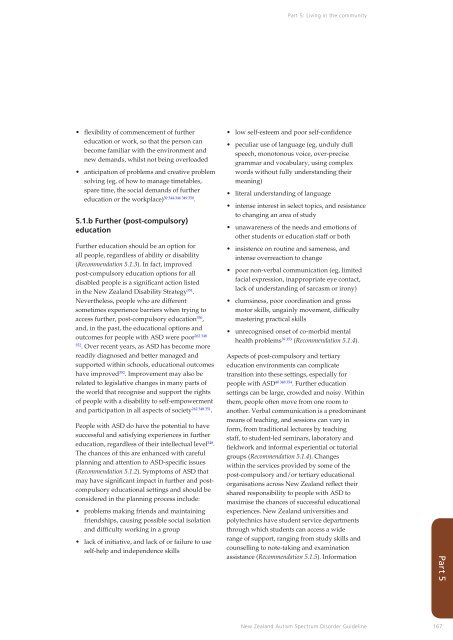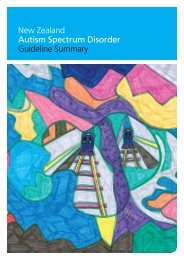New Zealand Autism Spectrum Disorder Guideline - Ministry of Health
New Zealand Autism Spectrum Disorder Guideline - Ministry of Health
New Zealand Autism Spectrum Disorder Guideline - Ministry of Health
Create successful ePaper yourself
Turn your PDF publications into a flip-book with our unique Google optimized e-Paper software.
Part 5: Living in the community<br />
• flexibility <strong>of</strong> commencement <strong>of</strong> further<br />
education or work, so that the person can<br />
become familiar with the environment and<br />
new demands, whilst not being overloaded<br />
• anticipation <strong>of</strong> problems and creative problem<br />
solving (eg, <strong>of</strong> how to manage timetables,<br />
spare time, the social demands <strong>of</strong> further<br />
education or the workplace) 39 344-346 349 350 .<br />
5.1.b Further (post-compulsory)<br />
education<br />
Further education should be an option for<br />
all people, regardless <strong>of</strong> ability or disability<br />
(Recommendation 5.1.3). In fact, improved<br />
post-compulsory education options for all<br />
disabled people is a significant action listed<br />
in the <strong>New</strong> <strong>Zealand</strong> Disability Strategy 351 .<br />
Nevertheless, people who are different<br />
sometimes experience barriers when trying to<br />
access further, post-compulsory education 350 ,<br />
and, in the past, the educational options and<br />
262 348<br />
outcomes for people with ASD were poor<br />
352<br />
. Over recent years, as ASD has become more<br />
readily diagnosed and better managed and<br />
supported within schools, educational outcomes<br />
have improved 352 . Improvement may also be<br />
related to legislative changes in many parts <strong>of</strong><br />
the world that recognise and support the rights<br />
<strong>of</strong> people with a disability to self-empowerment<br />
and participation in all aspects <strong>of</strong> society 262 348 351 .<br />
People with ASD do have the potential to have<br />
successful and satisfying experiences in further<br />
education, regardless <strong>of</strong> their intellectual level 348 .<br />
The chances <strong>of</strong> this are enhanced with careful<br />
planning and attention to ASD-specific issues<br />
(Recommendation 5.1.2). Symptoms <strong>of</strong> ASD that<br />
may have significant impact in further and postcompulsory<br />
educational settings and should be<br />
considered in the planning process include:<br />
• problems making friends and maintaining<br />
friendships, causing possible social isolation<br />
and difficulty working in a group<br />
• lack <strong>of</strong> initiative, and lack <strong>of</strong> or failure to use<br />
self-help and independence skills<br />
• low self-esteem and poor self-confidence<br />
• peculiar use <strong>of</strong> language (eg, unduly dull<br />
speech, monotonous voice, over-precise<br />
grammar and vocabulary, using complex<br />
words without fully understanding their<br />
meaning)<br />
• literal understanding <strong>of</strong> language<br />
• intense interest in select topics, and resistance<br />
to changing an area <strong>of</strong> study<br />
• unawareness <strong>of</strong> the needs and emotions <strong>of</strong><br />
other students or education staff or both<br />
• insistence on routine and sameness, and<br />
intense overreaction to change<br />
• poor non-verbal communication (eg, limited<br />
facial expression, inappropriate eye contact,<br />
lack <strong>of</strong> understanding <strong>of</strong> sarcasm or irony)<br />
• clumsiness, poor coordination and gross<br />
motor skills, ungainly movement, difficulty<br />
mastering practical skills<br />
• unrecognised onset <strong>of</strong> co-morbid mental<br />
health problems 39 353 (Recommendation 5.1.4).<br />
Aspects <strong>of</strong> post-compulsory and tertiary<br />
education environments can complicate<br />
transition into these settings, especially for<br />
people with ASD 40 348 354 . Further education<br />
settings can be large, crowded and noisy. Within<br />
them, people <strong>of</strong>ten move from one room to<br />
another. Verbal communication is a predominant<br />
means <strong>of</strong> teaching, and sessions can vary in<br />
form, from traditional lectures by teaching<br />
staff, to student-led seminars, laboratory and<br />
fieldwork and informal experiential or tutorial<br />
groups (Recommendation 5.1.4). Changes<br />
within the services provided by some <strong>of</strong> the<br />
post-compulsory and/or tertiary educational<br />
organisations across <strong>New</strong> <strong>Zealand</strong> reflect their<br />
shared responsibility to people with ASD to<br />
maximise the chances <strong>of</strong> successful educational<br />
experiences. <strong>New</strong> <strong>Zealand</strong> universities and<br />
polytechnics have student service departments<br />
through which students can access a wide<br />
range <strong>of</strong> support, ranging from study skills and<br />
counselling to note-taking and examination<br />
assistance (Recommendation 5.1.5). Information<br />
Part 5<br />
<strong>New</strong> <strong>Zealand</strong> <strong>Autism</strong> <strong>Spectrum</strong> <strong>Disorder</strong> <strong>Guideline</strong> 167











